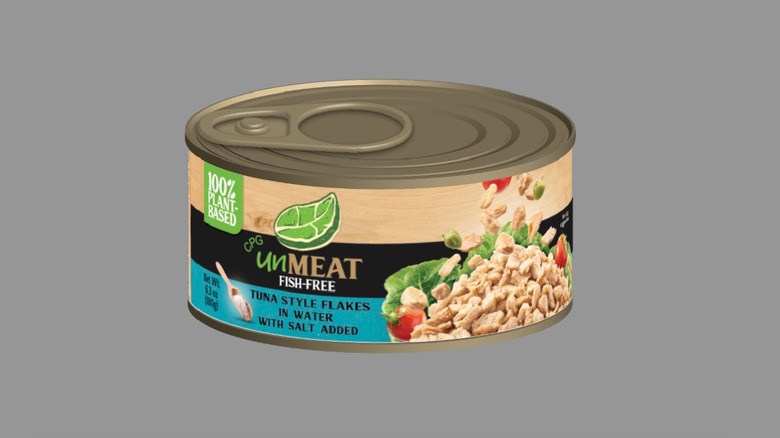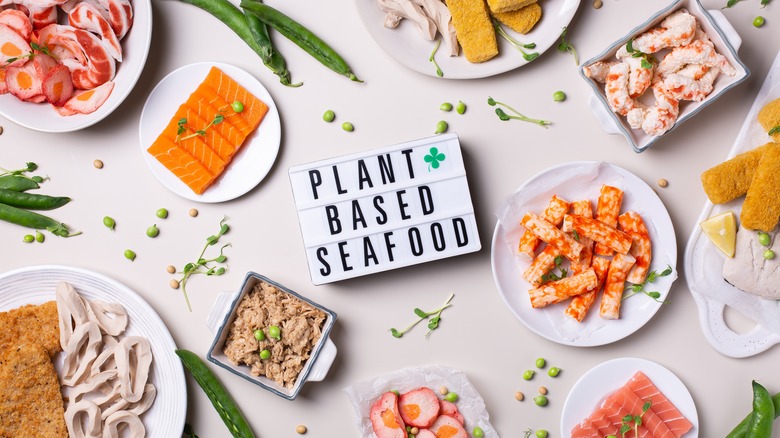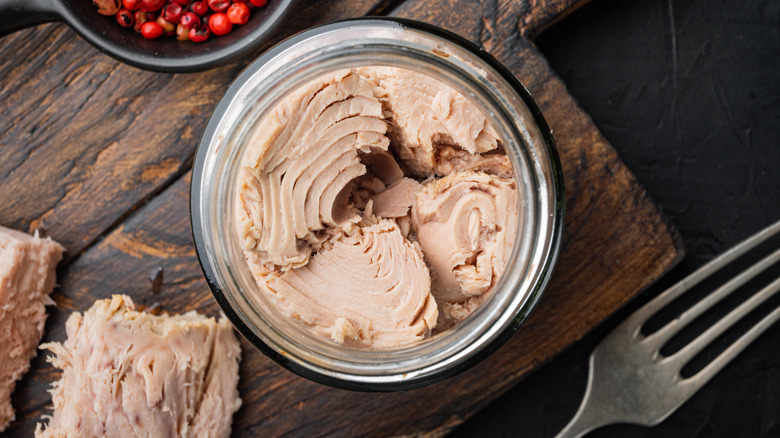Canned Vegan Tuna Is A Thing, But What Is It Made Of?
People who follow a vegan diet choose not to eat meat and seafood, including conventional canned tuna, because of their commitment to an animal-free lifestyle. After all, traditional canned tuna is made from fish, and the fishing industry is associated with ethical and environmental concerns, including overfishing, bycatch, and habitat destruction. Luckily, we've come a long way with plant-based alternatives and vegans no longer have to skip out on a good tuna salad sandwich or tuna melt. But what is canned vegan tuna made of?
Cruelty-free and sustainable, canned vegan tuna can be made in a few different ways. The most common brands employ a blend of soy and wheat proteins, as well as various seasonings, and some contain seaweed or algae extract or powder. Others rely on protein mixes containing additional fortifiers from peas, chickpeas, fava beans, navy beans, and lentils. The plant-based proteins provide a meaty texture while the marine extracts contribute a subtle oceanic flavor reminiscent of the sea.
The evolution of plant-based seafood
Although plant-based meat alternatives have skyrocketed in popularity over the last decade or so, their seafood counterparts were slower to market. But as the demand for plant-based options rises, companies are developing products that replicate the taste, texture, and nutritional benefits of various seafood, including tuna, shrimp, crab, and salmon. "Unlike plant-based burgers, seafood has been quite challenging to replicate and has seen a slower pace in terms of innovations," Yamina Tsalamlal, a consumer analyst at GlobalData, tells Vegconomist. "But the seafood industry continues to grow — per capita consumption of seafood increased by 10% between 2015 and 2019."
Besides the environmental pluses of plant-based seafood, there are also health benefits. Consuming items such as canned vegan tuna limits exposure to harmful mercury, a neurotoxin that can have detrimental effects on the nervous system, according to the World Health Organization. Regular canned tuna has a higher mercury level than most other commonly consumed seafood, just an 8-ounce serving can exceed the weekly recommended mercury intake for an adult.
Does canned vegan tuna actually taste like tuna?
There are a lot of tuna wannabe contenders on the market, ranging from Nestle's Garden Gourmet Sensational Vuna, Good Catch's Plant-Based Tuna, Loma Linda Tuno, Jinka Plant-Based Tuna Original, Unmeat Tuna Style Flakes, and more. But do these products taste like the real thing?
Some come quite close, according to tuna aficionados on Reddit. "Good [C]atch is the only one I have had that is good," one person commented. "Not really super fishy, but nice texture and not too salty like some of the others." Another thread discussed the pros of Loma Linda's Tuno, which comes in a variety of flavors. "I had the plain one and made it like I used to make tuna fish sandwiches (a little bit of relish and mayo)," one Redditor wrote. "It definitely hit a few of the notes and came close to what I miss."
While it's unlikely that plant-based tuna will ever taste exactly the same as the real thing, it sounds like there are several high-quality, nicely flavored options already on the market.


